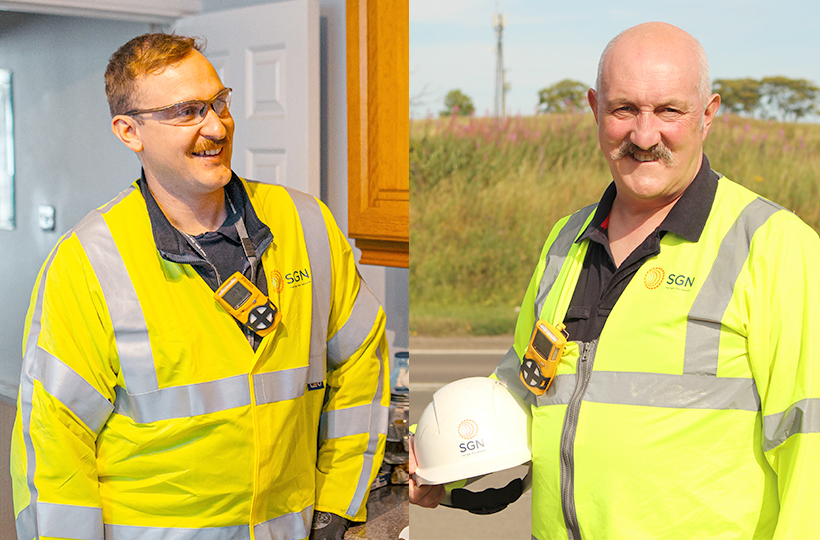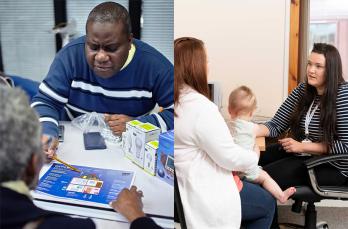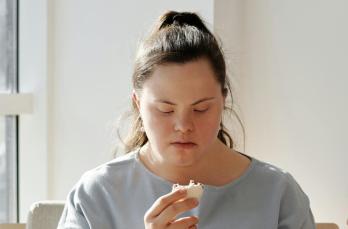
Our recently published Vulnerability and Carbon Monoxide Allowance (VCMA) annual report details the projects and partnerships helping our vulnerable customers stay safe and warm.
In our final blog of the series, Group Social Impact and Vulnerability Manager Kerry Potter explains how our frontline engineers work with our partners to make a difference to the lives of vulnerable people.
When our frontline engineers are invited into peoples’ homes, they witness first-hand the vast variety of barriers customers face when trying to maintain a safe and warm home. Our engineers continue to tell us, loud and clear, they never want to walk away from a customer in need.
This year in particular, our engineers have observed the increasing pressure felt by many households as the cost-of-living crisis deepened. They’ve seen an increase in the number of customers struggling to afford the basics, something that’s backed up by the increase in households they’ve referred to our partners for energy advice and mental health support.
In the winter of 2022, we piloted our Safe & Warm Mobile Community Hubs, establishing a new service to extend our Careline service into communities and enable us to further support customers in financial hardship over the winter months. We’ve evolved the service this year, establishing a dedicated Safe & Warm community team offering support to vulnerable customers on their doorsteps all year round. With this new team trained by our programme partners, our communities are benefiting from a dedicated energy and vulnerability expert embedded in the heart of our operational projects.
With support from our stakeholders and Ofgem, the gas networks have worked together to ensure there is a consistent provision of support for customers who need to have their gas supply isolated due to unsafe pipework, unsafe essential gas appliances or where we suspect CO.
Through this collaborative approach, we can all provide support to vulnerable customers who meet the eligibility criteria. By funding the services of a Gas Safe engineer to repair or replace unsafe pipework or appliances, we’re able to minimise the impact of the emergency and prevent low-income vulnerable households from being left without gas indefinitely.
Case study: our frontline engineers
Every day, our frontline engineers visit customer homes to attend gas emergencies and upgrade our gas network. They’re invited into the homes of some of the most vulnerable people in our communities.
Our engineers pride themselves on always delivering a 10/10 customer service and have told us time again they never want to walk away from a customer in need. Their real-time insight into customer need, and the resources they need to be able to help a customer in crisis, helps us shape our vulnerability strategy.
From the second they walk into a customer’s home our engineers are thinking about reassuring them and keeping them safe. This safety-first culture is in their DNA. But now, they’re also thinking about all the ways they could offer extra support to households in need to keep them safe and warm beyond their visit, using the tools and services they’ve actively helped co-design.
This year, our frontline teams referred 7,433 vulnerable customers to our Careline team for extra help, the highest annual number of referrals to date. It’s thanks to people like First Call Operatives Sam Batcheler and David Kaminski.
Sam immediately recognised she needed extra help from our Careline team and requested an urgent referral to our partner Universal Gas Solutions. They assessed her eligibility for funded support and arranged for a Gas Safe registered engineer to visit Ms S the same day. Sam’s quick action meant the impact of Ms S’s emergency was kept to a minimum and her hob was replaced for free within days.
Ms S said: “Sam, the engineer sent to assess the leak, was amazing. It was more like having a member of my own family help me! He organised a hot plate to tide me over until they replaced the hob, secured the leak, ordered me a CO alarm and made me feel safe in my own home again.”
David has referred more vulnerable customers for extra help from our Careline team than any other engineer in Scotland or the south of England. This year alone, David has helped 193 customers access 543 unique support services, including identifying 123 households for the Priority Services Register. Through internal news articles and in-person mentoring, David is encouraging his colleagues to identify opportunities to make the difference for our vulnerable customers.
David said: “I always assume someone is vulnerable until I can confirm they aren’t. I have always liked helping people and encourage my colleagues to do the same. If I see someone is struggling, it is always nice to help and I support others to do the same.”
Case study: Universal Gas Solutions
Many vulnerable households are unable to meet this unexpected cost or find it challenging to arrange a repair, meaning they are forced to remain off supply longer than necessary. Our Care and Repair scheme provides emergency funding to ensure vulnerable households are not left without gas indefinitely because they can’t afford the unplanned repair or replacement.
Gas Safe registered engineers from our delivery partner Universal Gas Solutions will repair or replace the faulty appliance or pipework, or service the appliance as required. Working with a trusted Gas Safe registered organisation ensures our customers can be supported within the first 24 hours of their gas going off.
If we’ve needed to isolate the gas supply to a vulnerable household due to a suspected or confirmed carbon monoxide (CO) leak from an appliance, the Universal Gas Solutions engineers will also test for CO in line with appropriate procedures. If these tests identify CO from a faulty appliance, the engineers can repair or replace it for the customer and reduce the amount of time the customer is without their gas supply.
Emma Banbury from the Universal Gas Solutions triage team said: “When we receive a referral from the SGN team, we respond quickly to put the customer at ease. We take the time to explain to vulnerable customers what help is available to them and reassure them about the steps we’ll take to restore their supply as soon as possible.”




